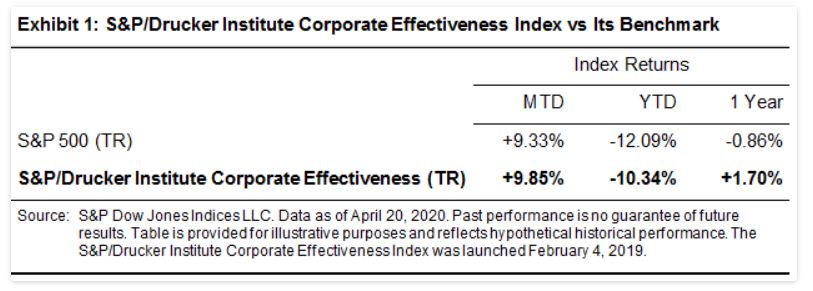Written by: Indexology Blog | S&P Dow Jones Indices
Ignorance is among the most reliable side effects of a one-in-100-year event. Whether hurricane, market crash, or pandemic, the valuable information most investors cannot know will dwarf what they can know—let alone what they actually do know.
Now, there’s a new source of insight: the S&P/Drucker Institute Corporate Effectiveness Index. And it’s had a strong first full year as a live index since launching in February of 2019.
The index takes a decidedly different approach than its more conventional ESG stablemates. Widely adopted ESG metrics determine less than 20% of a stock’s Corporate Effectiveness score, which drives constituent selection and weighting in the index. Instead, much of a company’s score is based on its management’s so-called “intangibles” that are in fact highly material: customer satisfaction, innovation, and employee engagement. What’s more, the index has achieved its record with a strong adherence to the holistic, humanistic management principles of Peter Drucker, appealing to investors who seek a no-compromise balance of outperformance and values.
The Drucker principles used to construct the index are the same on which many conventional ESG factors are built—and nearly identical to the pillars of the Business Roundtable’s headline-grabbing 2019 statement on the purpose of a corporation (a declaration that S&P Global’s CEO Douglas Peterson himself signed).
Analogous to the human body, where conventional ESG indices focus on the heart, the Corporate Effectiveness index aims to examine the entire corporate anatomy. This holistic approach can result in significant constituent differences from mainstream ESG indices while still achieving exceptional performance vs. the S&P 500.

Clorox and Costco illustrate the Corporate Effectiveness Index’s holistic, values-driven path to outperformance.
Clorox (+25.85% YTD) has the tenth-highest weight in the index (which is weighted by score) while it doesn’t even crack the top 100 in the S&P 500 ESG index (weighted by float-adjusted market cap). While both indices give Clorox a boost for its excellent industry-relative ESG performance (94th percentile), the S&P/Drucker Institute Corporate Effectiveness Index is also bullish on the firm for its 95th-percentile scores in Customer Satisfaction and Employee Engagement and Development.
Costco (+6.98% YTD) is a similar case study. The S&P 500 ESG index excluded the stock entirely because Costco’s ESG score was too low relative to its industry group. But Costco has the 25th-highest weight in the Corporate Effectiveness index thanks to its balanced strengths in Employee Engagement and Development (96th percentile), Customer Satisfaction (86th percentile) and Innovation (83rd percentile). By design and in keeping with Drucker’s principles, the Corporate Effectiveness approach treats these other dimensions as equally important indicators of a company’s ability to align economic success with social contribution.
For now, both Clorox and Costco are benefiting from new economic priorities under a pandemic. And when the uncertainties of this crisis eventually fall away, both firms will emerge with strong customer and employee relationships to help them meet whatever challenges and opportunities come next.
For investors who want an index comprised of companies doing good and doing well, there’s little uncertainty about the value of that.
Related:

